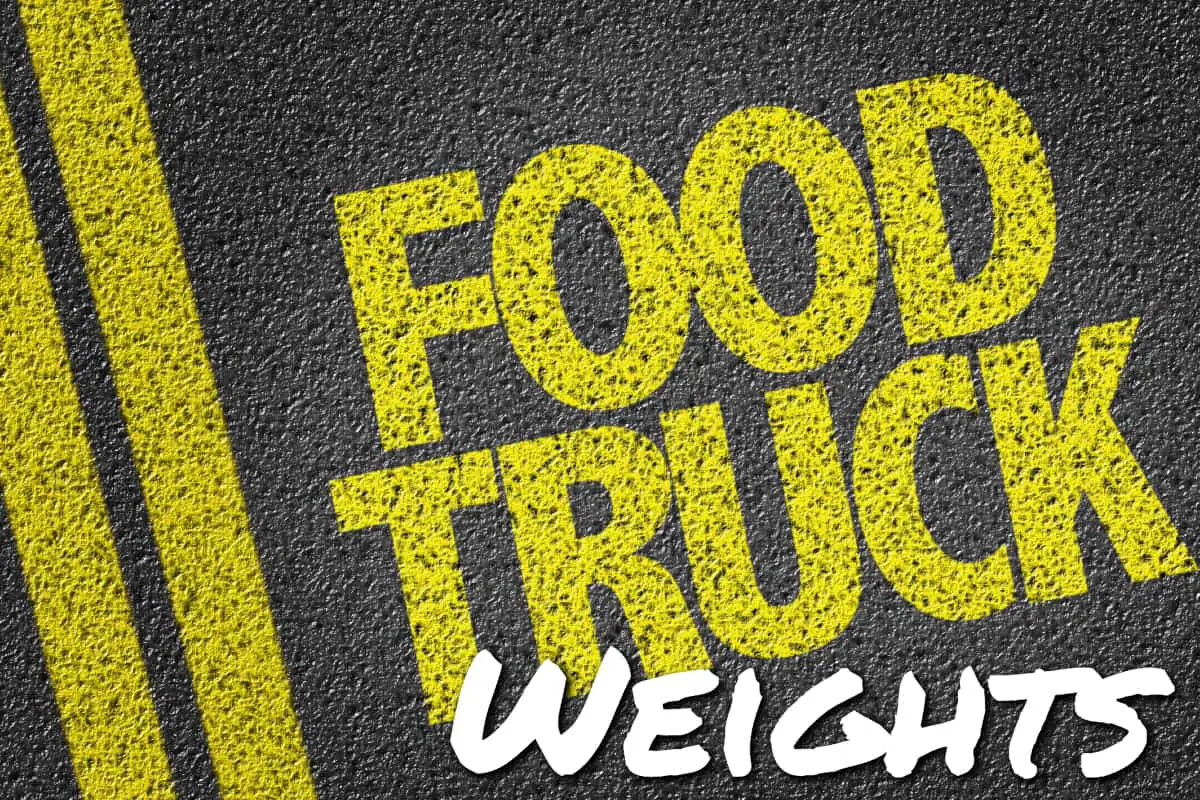Food trucks have always been a popular on-the-go place to eat, but they’ve become incredibly popular in recent years making now an awesome time to get into the business. Before you can start looking into buying a food truck though you need to think about its total weight to figure out what weight makes the most sense for your situation.
So, how much does the average food truck weigh? If you want to buy a motorized food truck, it’ll weigh about 16,000 pounds with everything inside. On the other hand, towed food trucks only weigh about 1,500 to 2,000 pounds, depending on the internal components and the dimensions.
Throughout this article, you’ll learn all about multiple examples of food truck weights, what factors impact how much they weigh, and why it’s crucial to pay attention to the overall mass of your potential food truck.
How Much Does a Food Truck Weigh? Here Are Some Examples
As you probably read in the introduction, the weight of a food truck can vary drastically. Ranging from 1,500 to 16,000 pounds, it’s nearly impossible to pinpoint the average. You also need to take tongue weight into account, which is the downward force the trailer puts on the hitch of the towing vehicle (in pounds).
Here are several examples that’ll help to give you a better idea of how much a food truck can weigh.
| Type of Food Truck | Total Weight | Tongue Weight |
| Tow-Behind Trailer (8′ x 16′) | 1,500 to 2,000 Pounds | 5,500 Pounds |
| Tow-Behind Trailer (8′ x 18′) | 1,500 to 2,000 Pounds | 6,000 Pounds |
| Tow-Behind Trailer (8′ x 20′) | 1,500 to 2,000 Pounds | 6,500 to 7,500 Pounds |
| Motorized Food Truck | 12,000 to 16,000 Pounds | n/a |
Food truck trailers that are 8’ x 16’ usually weigh between 1,500 to 2,000 pounds. The tongue weight of the same trailer would be about 5,500 pounds as well. Here’s a real-life example from Oregon Food Trucks.
Towed food trucks that are 8’ x 18’ typically sit between 1,500 to 2,000 pounds. They have a tongue weight of 6,000, in most cases. Here’s a real-life example sold on Roaming Hunger.
An 8’ x 20’ food trailer weighs 1,500 to 2,000 pounds as well, and it has a tongue weight of about 6,500 to 7,500 pounds. Here’s a real-life example sold on Roaming Hunger.
Motorized food trucks on wheels can weigh between 12,000 pounds to 16,000 pounds, making them much heavier than the average vehicle. If you’re not used to driving something this heavy, you should definitely consider training courses. Here’s a real-life example on Roaming Hunger.
What Increases or Decreases the Weight of a Food Truck?
When it comes to the weight of a food truck, there are far too many factors to give the exact weight of what yours will be. That being said, you can get a ballpark estimate if you know the answers to the primary factors.
Here are the most significant impacting factors that determine the weight of a food truck:
- The make and model of your vehicle are probably the smallest contributors, but they’re still worth mentioning. The Ford E450 Cutaway van weighs 14,000 pounds, and the company allows people to customize it into a food truck. On the other hand, Ford also has a full-sized Transit van that weighs only 2,600 pounds.
- Whether your food truck is a single motorized vehicle or a trailer that’s towed behind the primary vehicle is notable as well. Trailers weigh much less than motorized vehicles. You can get a trailer that’s twice as wide and three feet longer than a motorized truck, and it’ll weigh less than a fraction of it.
- The internal appliances affect the weight tremendously. If you’re only using a refrigerator, then you don’t need to worry too much. However, some food trucks have stoves, ovens, fridges, microwaves, toasters, and more. As you could probably imagine, the total climbs quickly.
- Along with the appliances that you put in, the items left behind matter as well. For example, if you’re using a van that has seats, you might want to consider removing them to reduce the weight. You could also cut out cabinetry, shelves for tools, and bathrooms if you’re renovating a campervan or a work van.
- Finally, the size of the vehicle matters more than anything. Tall, long, and wide trucks obviously weigh much more than their smaller counterparts. As you read in the examples above, the weight can vary with differences of about 500 pounds or so with trailers. Motorized vehicles vary by about 1,000 to 3,000 pounds.
Why Does the Weight of a Food Truck Matter?
All of this talk about how much the average food truck weighs might seem irrelevant, but that’s far from the truth. Numerous limitations, laws, and other problems can quickly become apparent after driving a heavyweight vehicle for only a few days. Most of us aren’t accustomed to driving vehicles that weigh more than a ton.
Something to keep in mind is that, even though you’re not driving a semi-truck, you still might have to abide by the same laws. For example, weighing stations will hold you up if you exceed the limit. Even if you’re running late to a new location, you’ll have to spend several minutes waiting to be approved at the scales.
Another reason that the weight of a food truck matters is that some roads simply can’t handle heavy vehicles. If there are signs that indicate such an issue, you won’t be able to drive on it with a large food truck. Not only is it inconvenient for navigating a city, but it also limits the areas that you can park and serve food.
You also have to think about the operational aspect of it all. As mentioned previously, most people aren’t used to driving heavy vehicles. Although the engine is big enough to handle the difference, you’ll still notice a massive weight change. Pushing harder on the gas, slower acceleration, and long braking are all part of the package.
Something else that you might want to think about is the cost of it all. Heavier vehicles require much more gasoline than lightweight vehicles. You can quickly increase your monthly gas expenses by hundreds of dollars if you’re not careful. Find areas that you can reduce weight on the food truck, but don’t overdo it.
Aside from the negatives aspects of large food trucks, there are plenty of reasons to desire them. For instance, there’s plenty of extra space to load it up with appliances and food to sell. You could make even more money despite the high cost of gasoline. On top of that, you’ll have more room to walk around without feeling cramped.
Conclusion
Before you pick out a random food truck because it meets all of your interior needs, you should check out the weight. Not only does it affect your driving style, but you’ll also have to deal with numerous limitations. There’s no doubting that big and small food trucks have their respective pros and cons, so figure out which weight is the best for your business.
Food trucks are expected to continue to grow in popularity and are a fantastic option for a restauranteur who wants to start their own business but lacks the financial resources for a brick and mortar location. While some might question the profitability of the food truck business model, it cannot be disputed that it has proven to be repeatedly successful for many owners.
Here are a handful of takeaways from the post:
- The average food truck weighs between 1,500 pounds to 16,000 pounds.
- More weight usually comes from more appliances and bigger dimensions.
- Some laws and restrictions limit your usage of large food trucks in certain areas.
- Food truck trailers are always less weight than motorized foot trucks.
- You might need a license to operate your food truck, depending on your location.
- Try only to carry the bare essentials to reduce the weight and save on gas expenses.
- Ford, Mercedes-Benz, and Chevy all make excellent vehicles that can be used as food trucks.
- Keep an eye out for brand-new customizable vehicles that convert to food trucks from companies such as Ford and Nissan.

